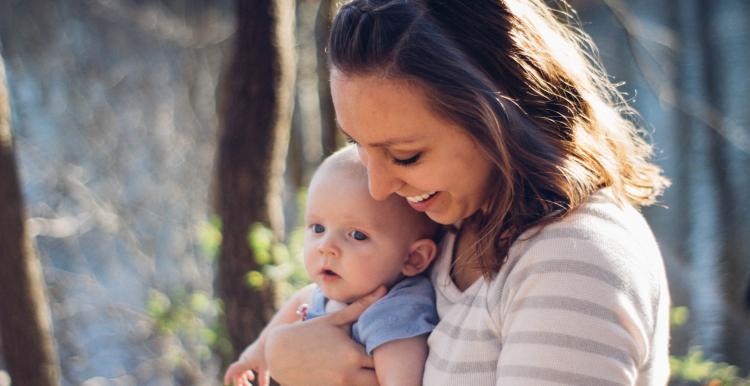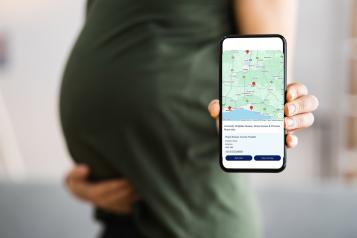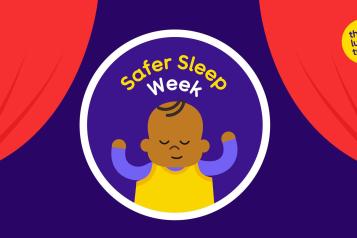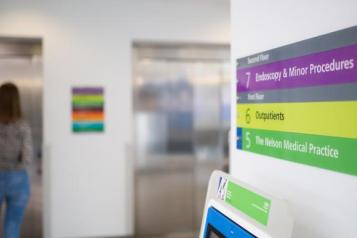Maternity support during COVID-19

Last updated on 16 July 2021
Restrictions related to the COVID-19 pandemic in England have been removed from 19 July 2021. To check the latest Government guidance please visit Gov.uk.
If you're pregnant, it's important you:
- wash your hands regularly
- take particular caution when meeting anyone outside your household or support bubble.
- stay away from anyone who has symptoms of coronavirus
You still need to go to all of your pregnancy (antenatal) scans and appointments unless you're told not to.
How does coronavirus affect pregnancy?
According to the NHS, it's expected that most pregnant women will experience mild or moderate cold or flu-like symptoms if you have COVID-19.
However, a small number of pregnant women can become unwell with COVID-19. Pregnant women who catch COVID-19 may be at increased risk of becoming severely unwell compared to women who aren't pregnant, particularly in the third trimester.
The Royal College of Obstetricians and Gynaecologists say that some studies have shown that there is an increased risk of giving birth early for pregnant women who become very unwell with COVID-19.
If you're pregnant and have an underlying health condition, such as asthma or diabetes, there is a further risk that you may be more unwell if you develop the virus.
Although the advice to shield has now been paused, if you have significant heart disease, congenital or acquired, you are considered extremely vulnerable and may wish to consider taking extra precautions by following government advice and guidance.
What effect will COVID-19 have on my baby if I am diagnosed with the infection?
Current evidence suggests that if you have COVID-19 it is unlikely to cause problems with your baby's development, and there have been no reports of this so far.
There is no evidence to suggest that COVID-19 infection in early pregnancy increases the risk of miscarriage. The Royal College of Obstetricians and Gynaecologists say that transmission of COVID-19 from a woman to her baby during pregnancy or childbirth is uncommon.
Tell us about your experience of maternity care
Has your maternity care been disrupted by COVID-19? Whether it’s good or bad, we want to hear from you.
It only takes five minutes and your feedback can help NHS and social care services understand the steps they can take to improve care for you and your loved ones.
Can I receive the COVID-19 vaccine if I am pregnant?
Yes, the Joint Committee on Vaccination and Immunisation (JCVI) has advised that pregnant women should be offered COVID-19 vaccines at the same time as people of the same age or risk group.
If you are pregnant and have been offered a COVID-19 vaccine, the decision whether to have the vaccination is your choice.
You may wish to discuss the benefits and risks of having the vaccine with their healthcare professional and reach a joint decision based on individual circumstances. However, as for the non-pregnant population, pregnant women can receive a COVID-19 vaccine even if they have not had a discussion with a healthcare professional.
Anyone who has already started vaccination and is offered a second dose whilst pregnant, should have a second dose with the same vaccine unless they had a serious side effect after the first dose.
Resources to help you make your decision
- The Royal College of Obstetricians and Gynaecologists - information help you make your choice about whether you’d like the vaccine or not.
- Public Health England - information for women of childbearing age, currently pregnant, planning a pregnancy or breastfeeding.
- The Oxford University Hospitals NHS Foundation Trust - a video series on the COVID-19 vaccination and pregnancy.
Has COVID-19 affected the care I should expect?
With NHS services changing the way they work in response to COVID-19, some people who are currently expecting children have told Healthwatch that they are concerned that about going into hospital during the current outbreak and that there is not enough support for them to give birth at home.
The NHS has written to services reminding them that they need to:
- Be in regular contact with all women receiving antenatal and postnatal care.
- Make clear to women how to access maternity services for scheduled and unscheduled care.
- Encourage them to raise any concerns so that the maternity teams can advise and reassure women of the best and safest place to receive care.
If you are worried you should contact the service who is supporting you to understand the support available and to discuss your concerns.
Keeping yourself and others safe
With restrictions ending across the UK it is important that you take particular care when meetingupwith your friends and family. You should read the government guidance but some steps you could continue to follow include:
- Meet outside rather than inside where possible.
- Continue to minimise the number of people you meet within a short period of time to limit the risk of spreading coronavirus.
- Get tested twice a week for free and isolate if you test positive for COVID-19.
- Avoid contact with someone who is displaying symptoms of coronavirus, such as a high temperature and/or new and continuous cough and/or a loss or change to their sense of smell or taste.
- Get vaccinated when you are offered it, and encourage others to do so as well.
What should pregnant women do if they have coronavirus symptoms?
If you get any symptoms of coronavirus (a high temperature, a new, continuous cough or a loss or change to your sense of smell or taste):
- Stay at home (self-isolate) – you and anyone you live with should not leave your home or have visitors. Anyone you've been in close contact with in the 48 hours before your symptoms started should also self-isolate.
- Book a test – get a PCR test to check if you have coronavirus as soon as possible. Anyone you live with, and anyone in your support bubble, should also get a PCR test if they have symptoms.
- Speak to your midwife or maternity team – they will advise you what to do. You may need to rebook some of your pregnancy appointments or have them online, by phone or as a video consultation.
In England, from 16 August, if you're fully vaccinated or under 18, you will not need to self-isolate following close contact with someone who has COVID-19. You'll still need to take a PCR test and self-isolate if it's positive.
Should pregnant women attend antenatal appointments?
- If you are well, it’s important that you still attend your antenatal appointment. If you are displaying symptoms of COVID-19, contact your community midwife to postpone your appointment until the self-isolation period is over.
- If you are due a routine scan or visit, check with your maternity unit for advice as you may still need to attend.
- If you are asked to attend a scan or an appointment, you should go.
Can someone come with me to my appointment?
The latest advice from the NHS to hospitals is that a partner or another chosen person should be allowed to accompany you all key appointments and scans. Your partner or chosen person may be required to have a negative COVID-19 test (or provide evidence of a negative test result from home) before visiting you on antenatal or postnatal wards.
This includes a birth partner who can be present with you during labour, birth and the immediate postnatal period.
Mental health advice for pregnant women
More than one in ten women develop a mental health issue during pregnancy or after giving birth. Pandemics, like coronavirus, are likely to cause anxiety. If expectant and new parents are worried about their mental wellbeing, they can get support from range of different organisations and charities. The Maternal Mental Health Alliance has an updated list of organisations that parents can contact during coronavirus.
Got another question?
As well as the advice available from the NHS, Government and charities the Royal College of Obstetrics and Gynaecology has also produced a detailed COVID-19 Q&A for pregnant women and their families covering:
- General advice.
- Getting antenatal care.
- Childbirth choices and birth partners.
- Having a COVID-19 infection or suspected infection.
- The period after birth.


